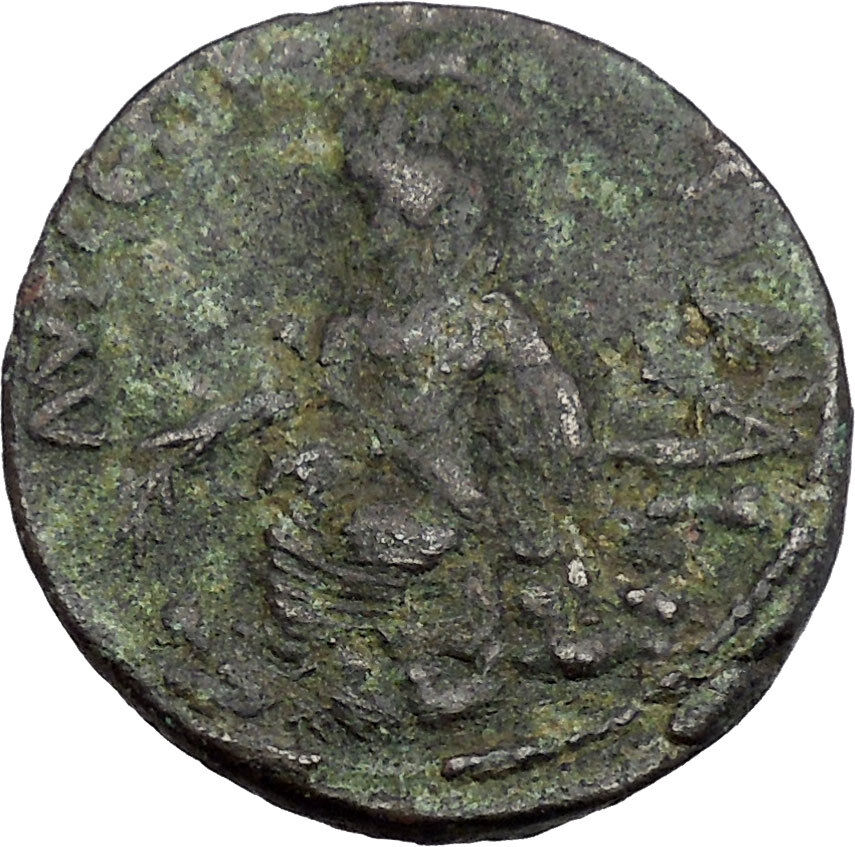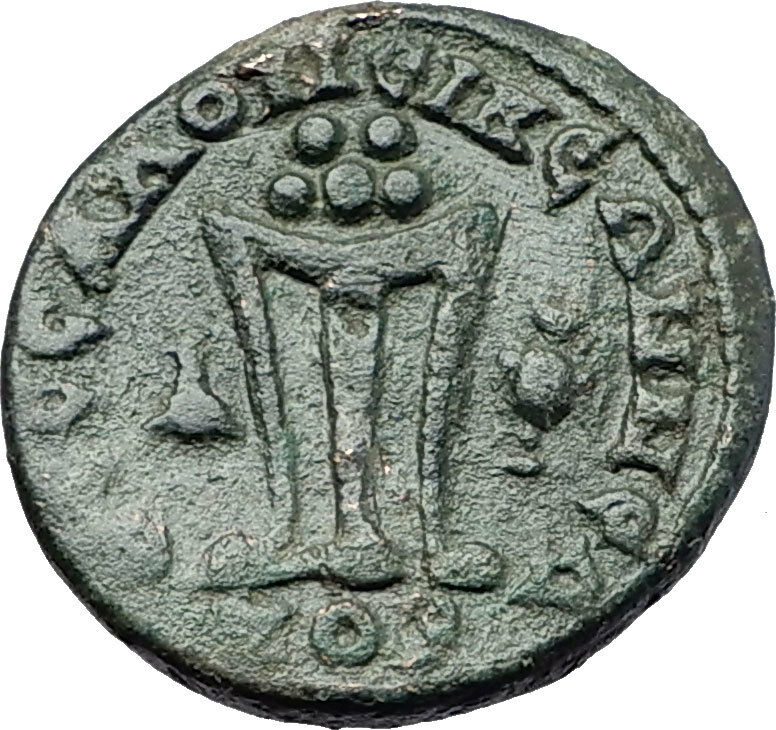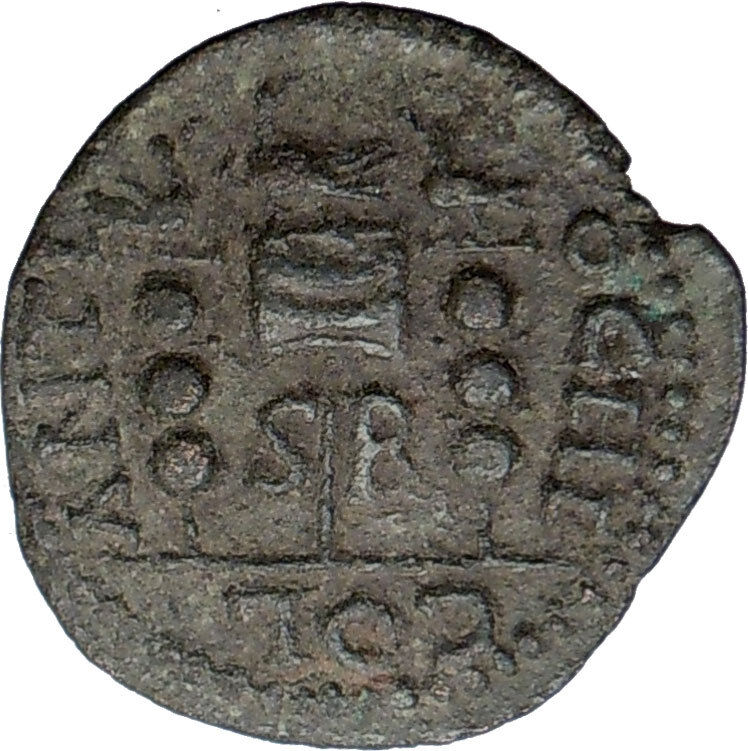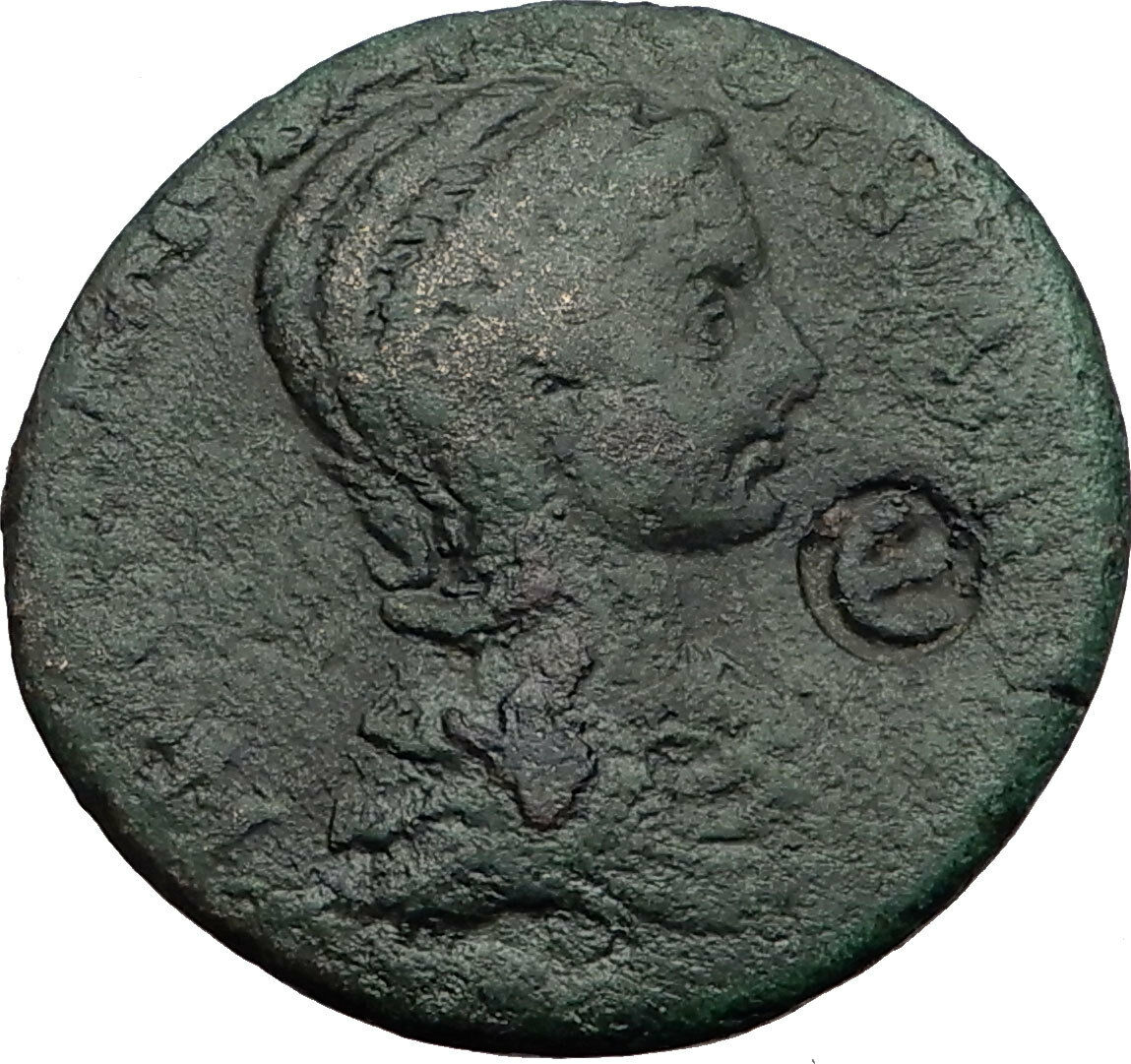Commodus
–
Roman Emperor
: 177-192 A.D.
Bronze 19mm (2.26 grams) Struck at the Roman
provincial city of Nicopolis ad Istrum in
Moecia Inferior circa 177-192 A.D.
AVT Λ KAI KOMOΔOC,
, Laureate head right.
NIKOΠOΛI ΠPOC IC,
Athena standing left, holding patera over lit altar
and spear with shield.
You are bidding on the exact item pictured,
provided with a Certificate of Authenticity and Lifetime Guarantee of
Authenticity.
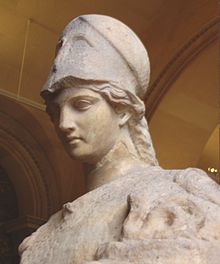
Helmeted Athena with the cista and Erichthonius in his serpent form.
Roman, first century (Louvre
Museum)
In
Greek religion
and
mythology
, Athena or Athene, also
referred to as Pallas Athena/Athene , is the goddess of wisdom, courage,
inspiration, civilization, law and justice, just warfare, mathematics, strength,
strategy, the arts, crafts, and skill.
Minerva
is the
Roman goddess
identified with
Athena.
Athena is also a shrewd companion of
heroes and is the
goddess
of heroic endeavour. She is the
virgin
patroness of
Athens
. The Athenians founded the
Parthenon
on the Acropolis of her namesake
city, Athens (Athena Parthenos), in her honour.
Athena’s veneration as the patron of Athens seems to have existed from the
earliest times, and was so persistent that archaic myths about her were recast
to adapt to cultural changes. In her role as a protector of the city (polis),
many people throughout the Greek world worshiped Athena as Athena Polias
(Ἀθηνᾶ Πολιάς “Athena of the city”). The city of
Athens
and the goddess Athena essentially bear
the same name, “Athenai” meaning “[many] Athenas”.
Patroness

Athenian
tetradrachm
representing the
goddess Athena
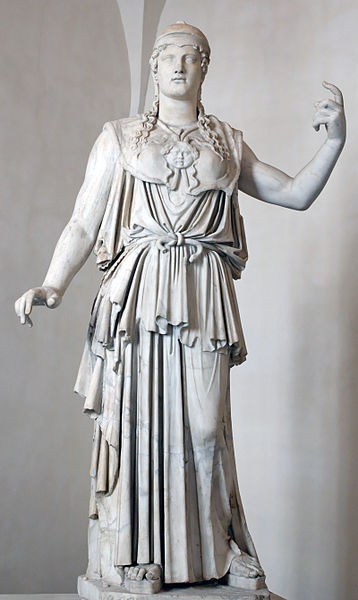
Athena
as the goddess of philosophy became an aspect of the cult in Classical Greece
during the late 5th century B.C. She is the patroness of various crafts,
especially of weaving
, as Athena Ergane, and was
honored as such at festivals such as
Chalceia
. The metalwork of weapons also fell
under her patronage. She led battles (Athena
Promachos or the warrior maiden Athena Parthenos) as the
disciplined, strategic side of war, in contrast to her brother
Ares, the patron of violence, bloodlust and slaughter—”the raw force
of war”. Athena’s wisdom includes the cunning intelligence (metis) of
such figures as Odysseus
. Not only was this version of Athena
the opposite of Ares in combat, it was also the polar opposite of the serene
earth goddess version of the deity, Athena Polias.
Athena appears in Greek mythology as the patron and helper of many heroes,
including Odysseus
,
Jason
, and
Heracles
. In
Classical Greek
myths, she never consorts with
a lover, nor does she ever marry,earning the title Athena Parthenos. A
remnant of archaic myth depicts her as the adoptive mother of
Erechtheus
/Erichthonius
through the foiled rape by
Hephaestus
. Other variants relate that
Erichthonius, the serpent that accompanied Athena, was born to
Gaia
: when the rape failed, the semen landed on
Gaia and impregnated her. After Erechthonius was born, Gaia gave him to Athena.
Though Athena is a goddess of war strategy, she disliked fighting without
purpose and preferred to use wisdom to settle predicaments.The goddess only
encouraged fighting for a reasonable cause or to resolve conflict. As patron of
Athens she fought in the Trojan war on the side of the Achaeans.
Mythology
Lady of Athens
Athena competed with
Poseidon
to be the patron deity of Athens,
which was yet unnamed, in a version of one
founding myth
. They agreed that each would give
the Athenians one gift and that the Athenians would choose the gift they
preferred. Poseidon struck the ground with his
trident
and a salt water spring sprang up; this
gave them a means of trade and water—Athens at its height was a significant sea
power, defeating the
Persian
fleet at the
Battle of Salamis
—but the water was salty and
not very good for drinking.
Athena, however, offered them the first domesticated
olive tree
. The Athenians (or their king,
Cecrops
) accepted the olive tree and with it
the patronage of Athena, for the olive tree brought wood, oil, and food.
Robert Graves
was of the opinion that
“Poseidon’s attempts to take possession of certain cities are political myths”
which reflect the conflict between matriarchal and patriarchal religions.
Other sites of cult
Athena also was the patron goddess of several other Greek cities, notably
Sparta, where the archaic cult of
Athena Alea
had its sanctuaries in the
surrounding villages of
Mantineia
and, notably,
Tegea
. In Sparta itself, the temple of Athena
Khalkíoikos (Athena “of the Brazen House”, often
latinized
as Chalcioecus) was the
grandest and located on the Spartan acropolis; presumably it had a roof of
bronze. The forecourt of the Brazen House was the place where the most solemn
religious functions in Sparta took place.
Tegea was an important religious center of ancient Greece, containing the
Temple of Athena Alea
. The temenos was founded by
Aleus
,
Pausanias
was informed. Votive bronzes at the
site from the Geometric and Archaic periods take the forms of horses and deer;
there are
sealstone
and
fibulae
. In the Archaic period the nine
villages that underlie Tegea banded together in a
synoecism
to form one city. Tegea was listed in
Homer
‘s
Catalogue of Ships
as one of the cities that
contributed ships and men for the
Achaean assault on Troy
.
Judgment of Paris

Aphrodite is being surveyed by Paris, while Athena (the leftmost
figure) and Hera stand nearby.
El Juicio de Paris
by
Enrique Simonet
, ca. 1904
All the gods and goddesses as well as various mortals were invited to the
marriage of Peleus
and
Thetis
(the eventual parents of
Achilles
). Only
Eris
, goddess of discord, was not invited. She
was annoyed at this, so she arrived with a golden apple inscribed with the word
καλλίστῃ (kallistēi, “for the fairest”), which she threw among the goddesses.
Aphrodite, Hera, and Athena all claimed to be the fairest, and thus the rightful
owner of the apple.
The goddesses chose to place the matter before Zeus, who, not wanting to
favor one of the goddesses, put the choice into the hands of Paris, a
Trojan prince. After bathing in the spring of
Mount Ida
(where Troy was situated), the
goddesses appeared before Paris. The goddesses undressed and presented
themselves to Paris naked, either at his request or for the sake of winning.

Paris is awarding the apple to Aphrodite, while Athena makes a face.
Urteil des Paris by
Anton Raphael Mengs
, ca. 1757
Still, Paris could not decide, as all three were ideally beautiful, so they
resorted to bribes. Hera tried to bribe Paris with control over all
Asia and Europe
, while Athena offered wisdom, fame and
glory in battle, but Aphrodite came forth and whispered to Paris that if he were
to choose her as the fairest he would have the most beautiful mortal woman in
the world as a wife, and he accordingly chose her. This woman was
Helen
, who was, unfortunately for Paris,
already married to King
Menelaus
of
Sparta
. The other two goddesses were enraged by
this and through Helen’s abduction by Paris they brought about the
Trojan War
.

The Parthenon
, Temple of Athena
Parthenos
Masculinity and
feminism
Athena had an “androgynous compromise” that allowed her traits and what she
stood for to be attributed to male and female rulers alike over the course of
history (such as Marie de’ Medici, Anne of Austria, Christina of Sweden, and
Catherine the Great)
J.J. Bachofen advocated that Athena was originally a maternal figure stable
in her security and poise but was caught up and perverted by a patriarchal
society; this was especially the case in Athens. The goddess adapted but could
very easily be seen as a god. He viewed it as “motherless paternity in the place
of fatherless maternity” where once altered, Athena’s character was to be
crystallized as that of a patriarch.
Whereas Bachofen saw the switch to paternity on Athena’s behalf as an
increase of power, Freud on the contrary perceived Athena as an “original mother
goddess divested of her power”. In this interpretation, Athena was demoted to be
only Zeus’s daughter, never allowed the expression of motherhood. Still more
different from Bachofen’s perspective is the lack of role permanency in Freud’s
view: Freud held that time and differing cultures would mold Athena to stand for
what was necessary to them.
Commodus (Latin:
Marcus Aurelius Commodus Antoninus Augustus;
31 August, 161 AD – 31 December, 192 AD), was
Roman Emperor
from 180 to 192. He also ruled as
co-emperor with his father
Marcus Aurelius
from 177 until his father’s
death in 180.
His accession as emperor was the first time a son had succeeded his father
since Titus
succeeded
Vespasian
in 79. He was also the first Emperor
to have both a father and grandfather as the two preceding Emperors. Commodus
was the first (and until 337 the only) emperor “born
in the purple“; i.e. during his father’s reign.
Commodus was assassinated in 192.
Early life and rise to power (161–180)
Early life
Commodus was born on 31 August 161, as Commodus, in
Lanuvium
, near
Rome
. He was the son of the reigning emperor,
Marcus Aurelius, and Aurelius’s first cousin, Faustina the Younger; the youngest
daughter of
Roman Emperor
Antonius Pius
. Commodus had an elder twin
brother, Titus Aurelius Fulvus Antoninus, who died in 165. On 12 October 166,
Commodus was made
Caesar
together with his younger brother,
Marcus Annius Verus
. The latter died in 169
having failed to recover from an operation, which left Commodus as Marcus
Aurelius’ sole surviving son.
He was looked after by his father’s physician,
Galen
, in order to keep Commodus healthy and
alive. Galen treated many of Commodus’ common illnesses. Commodus received
extensive tuition at the hands of what Marcus Aurelius called “an abundance of
good masters.” The focus of Commodus’ education appears to have been
intellectual, possibly at the expense of military training.
Commodus is known to have been at
Carnuntum
, the headquarters of Marcus Aurelius
during the
Marcomannic Wars
, in 172. It was presumably
there that, on 15 October 172, he was given the victory title Germanicus,
in the presence of the
army
. The title suggests that Commodus was
present at his father’s victory over the
Marcomanni
. On 20 January 175, Commodus entered
the
College of Pontiffs
, the starting point of a
career in public life.
In April 175,
Avidius Cassius
, Governor of
Syria
, declared himself Emperor following
rumors that Marcus Aurelius had died. Having been accepted as Emperor by Syria,
Palestine
and
Egypt
, Cassius carried on his rebellion even
after it had become obvious that Marcus was still alive. During the preparations
for the campaign against Cassius, the Prince assumed his
toga virilis
on the
Danubian
front on 7 July 175, thus formally
entering
adulthood
. Cassius, however, was killed by one
of his centurions
before the campaign against him
could begin.
Commodus subsequently accompanied his father on a lengthy trip to the Eastern
provinces, during which he visited
Antioch
. The Emperor and his son then traveled
to Athens
, where they were initiated into the
Eleusinian mysteries
. They then returned to
Rome in the Autumn
of 176.
Joint rule
with father (177)
Marcus Aurelius was the first emperor since
Vespasian
to have a biological son of his own
and, though he himself was the fifth in the line of the so-called
Five Good Emperors
, each of whom had adopted
his successor, it seems to have been his firm intention that Commodus should be
his heir. On 27 November 176, Marcus Aurelius granted Commodus the rank of
Imperator
and, in the middle of 177, the
title
Augustus
, giving his son the same status as
his own and formally sharing power.
On 23 December of the same year, the two Augusti celebrated a joint
triumph
, and Commodus was given
tribunician
power. On 1 January 177, Commodus
became consul
for the first time, which made him, aged
15, the youngest consul in Roman history up to that time. He subsequently
married
Bruttia Crispina
before accompanying his father
to the Danubian front once more in 178, where Marcus Aurelius died on 17 March
180, leaving the 18-year-old Commodus sole emperor.
Sole reign
(180–192)
Upon his accession Commodus devalued the
Roman currency
. He reduced the weight of the
denarius
from 96 per
Roman pound
to 105 (3.85 grams to 3.35 grams).
He also reduced the silver purity from 79 percent to 76 percent – the silver
weight dropping from 2.57 grams to 2.34 grams. In 186 he further reduced the
purity and silver weight to 74 percent and 2.22 grams respectively, being 108 to
the Roman pound. His reduction of the denarius during his rule was the largest
since the empire’s first devaluation during
Nero‘s reign.
Whereas the reign of
Marcus Aurelius
had been marked by almost
continuous warfare, that of Commodus was comparatively peaceful in the military
sense but was marked by political strife and the increasingly arbitrary and
capricious behaviour of the emperor himself. In the view of
Dio Cassius
, a contemporary observer, his
accession marked the descent “from a kingdom of gold to one of rust and iron” –
a famous comment which has led some historians, notably
Edward Gibbon
, to take Commodus’s reign as the
beginning of the
decline of the Roman Empire
.
Despite his notoriety, and considering the importance of his reign,
Commodus’s years in power are not well chronicled. The principal surviving
literary sources are Dio Cassius (a contemporary and sometimes first-hand
observer, but for this reign, only transmitted in fragments and abbreviations),
Herodian
and the
Historia Augusta
(untrustworthy for its
character as a work of literature rather than history, with elements of fiction
embedded within its biographies; in the case of Commodus, it may well be
embroidering upon what the author found in reasonably good contemporary
sources).
Commodus remained with the Danube armies for only a short time before
negotiating a peace treaty with the Danubian tribes. He then returned to Rome
and celebrated a triumph for the conclusion of the wars on 22 October 180.
Unlike the preceding Emperors
Trajan
,
Hadrian
,
Antoninus Pius
and Marcus Aurelius, he seems to
have had little interest in the business of administration and tended throughout
his reign to leave the practical running of the state to a succession of
favourites, beginning with
Saoterus
, a freedman from
Nicomedia
who had become his
chamberlain
.
Dissatisfaction with this state of affairs would lead to a series of
conspiracies and attempted coups, which in turn eventually provoked Commodus to
take charge of affairs, which he did in an increasingly dictatorial manner.
Nevertheless, though the
senatorial order
came to hate and fear him, the
evidence suggests that he remained popular with the army and the common people
for much of his reign, not least because of his lavish shows of largesse
(recorded on his coinage) and because he staged and took part in spectacular
gladiatorial
combats.
One of the ways he paid for his donatives and mass entertainments was to tax
the senatorial order, and on many inscriptions, the traditional order of the two
nominal powers of the state, the Senate and People (Senatus Populusque
Romanus) is provocatively reversed (Populus Senatusque…).
The conspiracies of
182
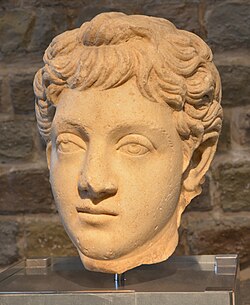
A bust of Commodus as a youth (Roman-Germanic
Museum, Cologne).
At the outset of his reign, Commodus, age 18, inherited many of his father’s
senior advisers, notably
Tiberius Claudius Pompeianus
(the second
husband of Commodus’s sister
Lucilla
), his father-in-law
Gaius Bruttius Praesens
, Titus Fundanius
Vitrasius Pollio, and
Aufidius Victorinus
, who was
Prefect of the City of Rome
. He also had five
surviving sisters, all of them with husbands who were potential rivals. Four of
his sisters were considerably older than he; the eldest, Lucilla, held the rank
of
Augusta
as the widow of her first husband,
Lucius Verus
.
The first crisis of the reign came in 182, when Lucilla engineered a
conspiracy against her brother. Her motive is alleged to have been envy of the
Empress
Crispina. Her husband, Pompeianus, was
not involved, but two men alleged to have been her lovers,
Marcus Ummidius Quadratus Annianus
(the consul
of 167, who was also her first cousin) and
Appius Claudius Quintianus
, attempted to murder
Commodus as he entered the theatre. They bungled the job and were seized by the
emperor’s bodyguard.
Quadratus and Quintianus were executed. Lucilla was exiled to
Capri
and later killed. Pompeianus retired from
public life. One of the two
praetorian prefects
,
Tarrutenius Paternus
, had actually been
involved in the conspiracy but was not detected at this time, and in the
aftermath, he and his colleague
Sextus Tigidius Perennis
were able to arrange
for the murder of Saoterus, the hated chamberlain.
Commodus took the loss of Saoterus badly, and Perennis now seized the chance
to advance himself by implicating Paternus in a second conspiracy, one
apparently led by
Publius Salvius Julianus
, who was the son of
the jurist
Salvius Julianus
and was betrothed to
Paternus’s daughter. Salvius and Paternus were executed along with a number of
other prominent consulars and senators.
Didius Julianus
, the future emperor, a relative
of Salvius Julianus, was dismissed from the governorship of
Germania Inferior
.
Cleander
Perennis took over the reins of government and Commodus found a new
chamberlain and favourite in
Cleander
, a
Phrygian
freedman
who had married one of the emperor’s
mistresses, Demostratia. Cleander was in fact the person who had murdered
Saoterus. After those attempts on his life, Commodus spent much of his time
outside Rome, mostly on the family estates at Lanuvium. Being physically strong,
his chief interest was in sport: taking part in
horse racing
,
chariot racing
, and combats with beasts and
men, mostly in private but also on occasion in public.
Dacia and Britain

A bust of Commodus (Kunsthistorisches
Museum, Vienna). According to
Herodian
he was well proportioned
and attractive, with naturally blonde and curly hair.
Commodus was inaugurated in 183 as consul with Aufidius Victorinus for a
colleague and assumed the title
Pius. War broke out in
Dacia
: few details are available, but it
appears two future contenders for the throne,
Clodius Albinus
and
Pescennius Niger
, both distinguished themselves
in the campaign. Also, in
Britain
in 184, the governor
Ulpius Marcellus
re-advanced the Roman frontier
northward to the
Antonine Wall
, but the
legionaries
revolted against his harsh
discipline and acclaimed another legate, Priscus, as emperor.
Priscus refused to accept their acclamations, but Perennis had all the
legionary legates
in Britain
cashiered
. On 15 October 184 at the
Capitoline Games
, a
Cynic
philosopher publicly denounced Perennis
before Commodus, who was watching, but was immediately put to death. According
to Dio Cassius, Perennis, though ruthless and ambitious, was not personally
corrupt and generally administered the state well.
However, the following year, a detachment of soldiers from Britain (they had
been drafted to
Italy
to suppress brigands) also denounced
Perennis to the emperor as plotting to make his own son emperor (they had been
enabled to do so by Cleander, who was seeking to dispose of his rival), and
Commodus gave them permission to execute him as well as his wife and sons. The
fall of Perennis brought a new spate of executions: Aufidius Victorinus
committed suicide. Ulpius Marcellus was replaced as
governor of Britain
by
Pertinax
; brought to Rome and tried for
treason, Marcellus narrowly escaped death.
Cleander’s zenith and fall (185–190)
Cleander proceeded to concentrate power in his own hands and to enrich
himself by becoming responsible for all public offices: he sold and bestowed
entry to the Senate, army commands,
governorships
and, increasingly, even the
suffect consulships
to the highest bidder.
Unrest around the empire increased, with large numbers of army deserters causing
trouble in Gaul
and
Germany
. Pescennius Niger mopped up the
deserters in Gaul in a military campaign, and a revolt in
Brittany
was put down by two
legions
brought over from Britain.
In 187, one of the leaders of the deserters, Maternus, came from Gaul
intending to assassinate Commodus at the Festival of the Great Goddess in March,
but he was betrayed and executed. In the same year,
Pertinax
unmasked a conspiracy by two enemies
of Cleander – Antistius Burrus (one of Commodus’s brothers-in-law) and Arrius
Antoninus. As a result, Commodus appeared even more rarely in public, preferring
to live on his estates.
Early in 188, Cleander disposed of the current praetorian prefect,
Atilius Aebutianus
, and himself took over
supreme command of the Praetorians at the new rank of a pugione
(“dagger-bearer”) with two praetorian prefects subordinate to him. Now at the
zenith of his power, Cleander continued to sell public offices as his private
business. The climax came in the year 190, which had 25 suffect consuls – a
record in the 1000-year history of the Roman consulship—all appointed by
Cleander (they included the future Emperor
Septimius Severus
).
In the spring of 190, Rome was afflicted by a food shortage, for which the
praefectus annonae
Papirius Dionysius
, the official actually in
charge of the
grain supply
, contrived to lay the blame on
Cleander. At the end of June, a mob demonstrated against Cleander during a horse
race in the
Circus Maximus
: he sent the praetorian guard to
put down the disturbances, but Pertinax, who was now City Prefect of Rome,
dispatched the
Vigiles Urbani
to oppose them. Cleander
fled to Commodus, who was at
Laurentum
in the house of the
Quinctilii
, for protection, but the mob
followed him calling for his head.
At the urging of his mistress
Marcia
, Commodus had Cleander beheaded and his
son killed. Other victims at this time were the praetorian prefect Julius
Julianus, Commodus’s cousin
Annia Fundania Faustina
, and his brother-in-law
Mamertinus. Papirius Dionysius was executed too.
The emperor now changed his name to Lucius Aelius Aurelius Commodus. At 29,
he took over more of the reins of power, though he continued to rule through a
cabal consisting of Marcia, his new chamberlain Eclectus, and the new praetorian
prefect
Quintus Aemilius Laetus
, who about this time
also had many Christians freed from working in the mines in
Sardinia
. Marcia, the widow of Quadratus, who
had been executed in 182, is alleged to have been a Christian.
Megalomania
(190–192)
In opposition to the Senate, in his pronouncements and
iconography
, Commodus had always laid stress on
his unique status as a source of god-like power, liberality and physical
prowess. Innumerable statues around the empire were set up portraying him in the
guise of Hercules
, reinforcing the image of him as a
demigod, a physical giant, a protector and a battler against beasts and men (see
“Commodus and Hercules” and “Commodus the Gladiator” below). Moreover, as
Hercules, he could claim to be the son of
Jupiter
, the representative of the supreme god
of the Roman
pantheon
. These tendencies now increased to
megalomaniac
proportions. Far from celebrating
his descent from Marcus Aurelius, the actual source of his power, he stressed
his own personal uniqueness as the bringer of a new order, seeking to re-cast
the empire in his own image.
During 191, the city of Rome was extensively damaged by a fire that raged for
several days, during which many public buildings including the
Temple of Pax
, the
Temple of Vesta
and parts of the imperial
palace were destroyed.
Perhaps seeing this as an opportunity, early in 192 Commodus, declaring
himself the new
Romulus
, ritually re-founded Rome, renaming the
city Colonia Lucia Annia Commodiana. All the months of the year were
renamed to correspond exactly with his (now twelve) names: Lucius,
Aelius, Aurelius, Commodus, Augustus, Herculeus,
Romanus, Exsuperatorius, Amazonius, Invictus,
Felix, Pius. The legions were renamed Commodianae, the fleet
which imported grain from
Africa
was termed Alexandria Commodiana
Togata, the Senate was entitled the Commodian Fortunate Senate, his palace
and the Roman people themselves were all given the name Commodianus, and
the day on which these reforms were decreed was to be called Dies Commodianus.
Thus he presented himself as the fountainhead of the Empire and Roman life
and religion. He also had the head of the
Colossus of Nero
adjacent to the
Colosseum
replaced with his own portrait, gave
it a club and placed a
bronze
lion at its feet to make it look like Hercules, and added an
inscription boasting of being “the only left-handed fighter to conquer twelve
times one thousand men”.
Character and
physical prowess
Character and
motivations
Dio Cassius, a first-hand witness, describes him as “not naturally wicked
but, on the contrary, as guileless as any man that ever lived. His great
simplicity, however, together with his cowardice, made him the slave of his
companions, and it was through them that he at first, out of ignorance, missed
the better life and then was led on into lustful and cruel habits, which soon
became second nature.”[8]
His recorded actions do tend to show a rejection of his father’s policies,
his father’s advisers, and especially his father’s austere lifestyle, and an
alienation from the surviving members of his family. It seems likely that he was
brought up in an atmosphere of
Stoic
asceticism
, which he rejected entirely upon his
accession to sole rule. After repeated attempts on Commodus’ life,
Roman citizens
were often killed for raising
his ire. One such notable event was the attempted extermination of the house of
the Quinctilii. Condianus and Maximus were executed on the pretext that, while
they were not implicated in any plots, their wealth and talent would make them
unhappy with the current state of affairs.
Changes of name
On his accession as sole ruler, Commodus added the name Antoninus to his
official nomenclature. In October 180 he changed his
praenomen
from Lucius to Marcus, presumably
in honour of his father. He later took the title of Felix in 185. In 191
he restored his praenomen to Lucius and added the family name Aelius,
apparently linking himself to Hadrian and Hadrian’s adopted son
Lucius Aelius Caesar
, whose original name was
also Commodus.
Later that year he dropped Antoninus and adopted as his full style Lucius
Aelius Aurelius Commodus Augustus Herculeus Romanus Exsuperatorius Amazonius
Invictus Felix Pius (the order of some of these titles varies in the sources). “Exsuperatorius”
(the supreme) was a title given to Jupiter, and “Amazonius” identified him again
with Hercules.
An inscribed altar from
Dura-Europos
on the Euphrates shows that
Commodus’s titles and the renaming of the months were disseminated to the
furthest reaches of the Empire; moreover, that even auxiliary military units
received the title Commodiana, and that Commodus claimed two additional titles:
Pacator Orbis (pacifier of the world) and Dominus Noster (Our
Lord). The latter eventually would be used as a conventional title by Roman
emperors, starting about a century later, but Commodus seems to have been the
first to assume it.
Commodus and Hercules
Disdaining the more philosophic inclinations of his father, Commodus was
extremely proud of his physical prowess. He was generally acknowledged to be
extremely handsome. As mentioned above, he ordered many statues to be made
showing him dressed as Hercules with a lion’s hide and a club. He thought of
himself as the reincarnation of Hercules, frequently emulating the legendary
hero’s feats by appearing in the arena to fight a variety of wild animals. He
was left-handed, and very proud of the fact. Cassius Dio and the writers of the
Augustan History
say that Commodus was a
skilled archer, who could shoot the heads off
ostriches
in full gallop, and kill a
panther
as it attacked a victim in the arena.
Commodus the gladiator
Commodus also had a passion for gladiatorial combat, which he took so far as
to take to the arena
himself, dressed as a gladiator. The
Romans found Commodus’s naked gladiatorial combats to be scandalous and
disgraceful. It was rumoured that he was actually the son, not of Marcus
Aurelius, but of a gladiator whom his mother Faustina had taken as a lover at
the coastal resort of
Caieta
.
In the arena, Commodus always won since his opponents always submitted to the
emperor. Thus, these public fights would not end in death. Privately, it was his
custom to slay his practice opponents. For each appearance in the arena, he
charged the city of Rome a million
sesterces
, straining the Roman economy.
Commodus raised the ire of many military officials in Rome for his Hercules
persona in the arena. Often, wounded soldiers and amputees would be placed in
the arena for Commodus to slay with a sword. Commodus’s eccentric behaviour
would not stop there. Citizens of Rome missing their feet through accident or
illness were taken to the arena, where they were tethered together for Commodus
to club to death while pretending they were giants. These acts may have
contributed to his assassination.
Commodus was also known for fighting exotic animals in the arena, often to
the horror of the Roman people. According to Gibbon, Commodus once killed 100
lions in a single day. Later, he decapitated a running ostrich with a specially
designed dart and afterwards carried the bleeding head of the dead bird and his
sword over to the section where the Senators sat and gesticulated as though they
were next. On another occasion, Commodus killed three
elephants
on the floor of the arena by himself.
Finally, Commodus killed a
giraffe
, which was considered to be a strange
and helpless beast.
Assassination (192)
In November 192 Commodus held Plebian Games, in which he shot hundreds of
animals with arrows and javelins every morning, and fought as a gladiator every
afternoon, winning all the bouts. In December he announced his intention to
inaugurate the year 193 as both consul and gladiator on 1 January.
At this point, the prefect Laetus formed a conspiracy with Eclectus to
supplant Commodus with Pertinax, taking Marcia into their confidence. On 31
December Marcia poisoned his food but he vomited up the poison; so the
conspirators sent his wrestling partner
Narcissus
to strangle him in his bath. Upon his
death, the Senate declared him a public enemy (a de facto
damnatio memoriae
) and restored the
original name to the city of Rome and its institutions. Commodus’s statues were
thrown down. His body was buried in the
Mausoleum of Hadrian
. In 195 the emperor
Septimius Severus
, trying to gain favour with
the family of Marcus Aurelius, rehabilitated Commodus’s memory and had the
Senate deify him.
Commodus was succeeded by
Pertinax
, whose reign was short lived, being
the first to fall victim to the
Year of the Five Emperors
. Commodus’s death
marked the end of the
Nervan-Antonian dynasty
.
Nicopolis ad Istrum was a
Roman
and Early
Byzantine
town founded by Emperor
Trajan
around
101–106, at the junction of the Iatrus (Yantra)
and the Rositsa
rivers, in memory of his victory over the
Dacians
. Its
ruins are located at the village of
Nikyup
, 20 km north of
Veliko Tarnovo
in northern
Bulgaria
.
The town reached its apogee during the reigns of Trajan,
Hadrian
, the
Antonines
and the
Severan dynasty
.
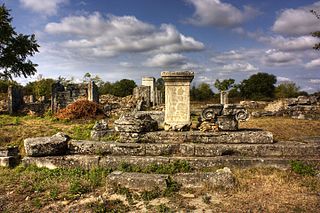
The classical town was planned according to the orthogonal system. The
network of streets, the forum surrounded by an Ionic colonnade and many
buildings, a two-nave room later turned into a basilica and other public
buildings have been uncovered. The rich architectures and sculptures show a
similarity with those of the ancient towns in Asia Minor. Nicopolis ad Istrum
had issued coins, bearing images of its own public buildings.
In
447 AD
, the town was destroyed by
Attila’s
Huns
.
Perhaps it was already abandoned before the early 400s.
In the 6th century, it was rebuilt as a powerful fortress enclosing little more
than military buildings and churches, following a very common trend for the
cities of that century in the Danube area.The largest area of the extensive ruins (21.55 hectares) of the classical
Nicopolis was not reoccupied since the fort covered only one fourth of it (5.75
hectares), in the southeastern corner.
The town became an episcopal centre during the early Byzantine period. It was
finally destroyed by the Avar invasions at the end of the 6th century. A
Bulgarian medieval settlement arose upon its ruins later (10th-14th century).
Nicopolis ad Istrum can be said to have been the birthplace of
Germanic
literary tradition. In the 4th century, the
Gothic
bishop,
missionary and translator
Ulfilas
(Wulfila)
obtained permission from Emperor
Constantius II
to immigrate with his flock of converts to Moesia and settle
near Nicopolis ad Istrum in 347-8.
There, he invented the
Gothic alphabet
and translated the
Bible
from
Greek
to
Gothic
.
|















